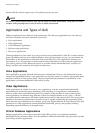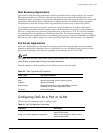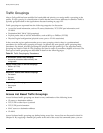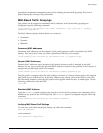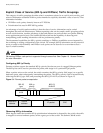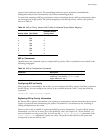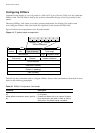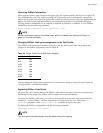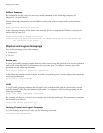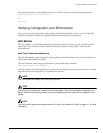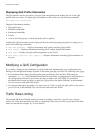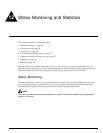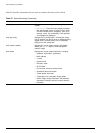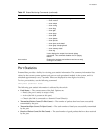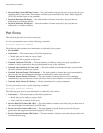
Traffic Groupings
Summit 300-48 Switch Software User Guide 129
Observing DiffServ Information
When a packet arrives at the switch on an ingress port, the switch examines the first six of eight TOS
bits, called the code point. The switch can assign the QoS profile used to subsequently transmit the
packet based on the code point. The QoS profile controls a hardware queue used when transmitting the
packet out of the switch, and determines the forwarding characteristics of a particular code point.
Viewing DiffServ information can be enabled or disabled; by default it is disabled. To view DiffServ
information, use the following command:
enable diffserv examination ports [<portlist> | all]
NOTE
DiffServ examination requires one access mask while it is enabled. See “Maximum Entries” on
page 111 for more information.
Changing DiffServ Code point assignments in the QoS Profile
The DiffServ code point has 64 possible values (2
6
= 64). By default, the values are grouped and
assigned to the default QoS profiles listed in Table 46.
You can change the QoS profile assignment for a code point by using an access list. See Chapter 10,
“Access Policies”, for more information.
Replacing DiffServ Code Points
An access list can be used to change the DiffServ code point in the packet prior to the packet being
transmitted by the switch. This is done with no impact on switch performance.
To replace the DiffServ code point, you will use an access list to set the new code point value. See
Chapter 10, “Access Policies”, for more information on using access lists. You will use the
set
code-point
parameter of the create access list command to replace the value.
To display the DiffServ configuration, use the following command:
show ports <portlist> info {detail}
NOTE
The show ports command displays only the default code point mapping.
Table 46: Default Code Point-to-QoS Profile Mapping
Code Point QoS Profile
0-7 Qp1
8-15 Qp2
16-23 Qp3
24-31 Qp4
32-39 Qp5
40-47 Qp6
48-55 Qp7
56-63 Qp8




